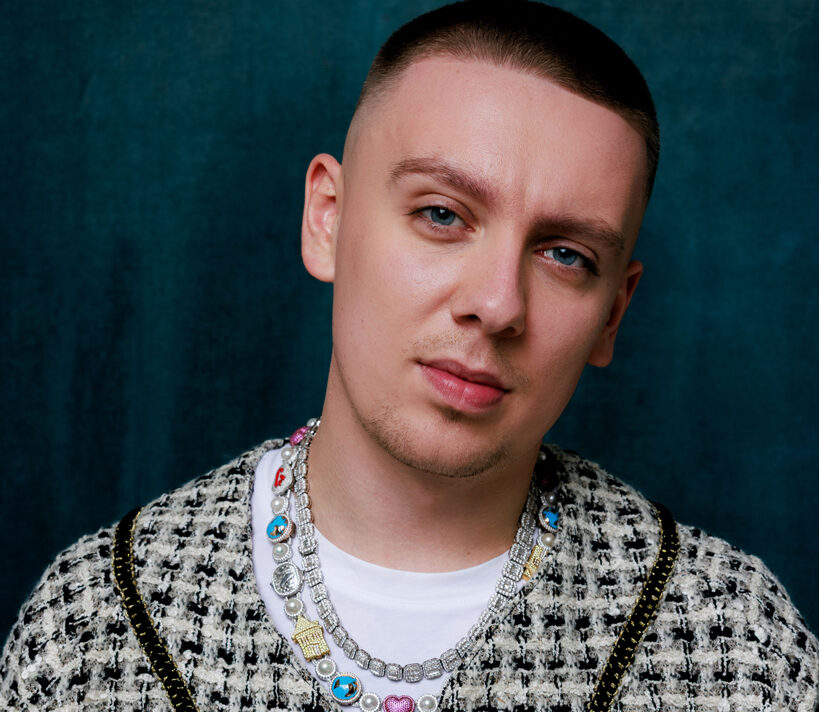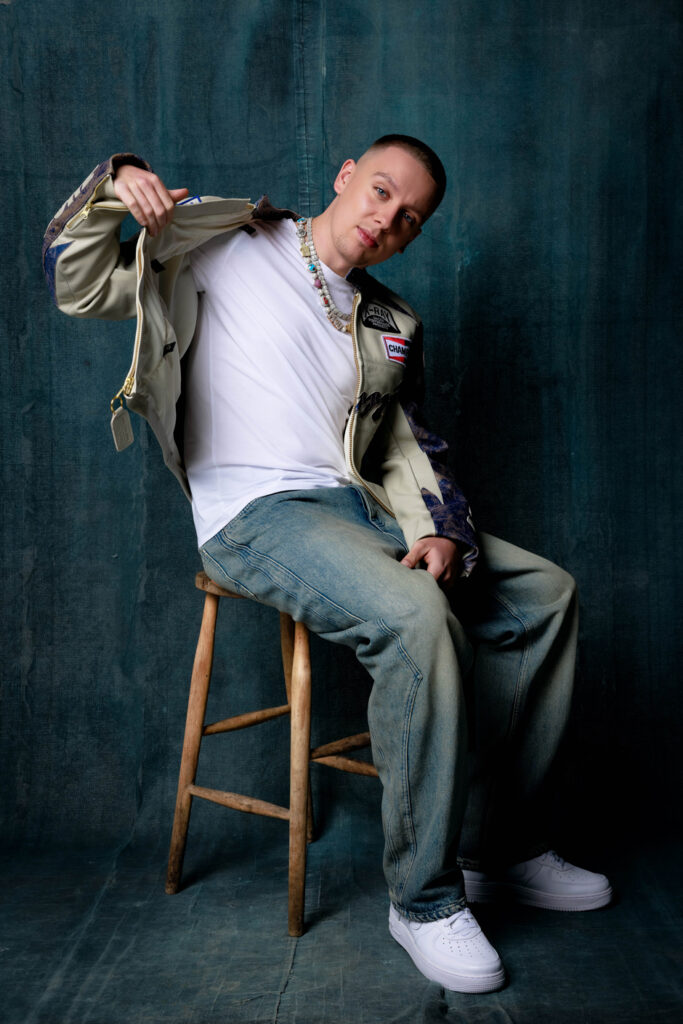Aitch: ‘I just wanna set good examples and spread good vibes’
Fresh from climbing Mount Kilimanjaro in aid of charity, Manchester rapper Aitch returns with a shackles-off second studio album crafted with high-energy live shows in mind

Arena shows with Coldplay, huge singles with Ashanti and Ed Sheeran, a BRIT Award, and a gargantuan charity fundraising campaign: Manchester rapper Aitch has scaled new heights over the past couple of years. But make no mistake, the fierce, no-nonsense rapping ability that caused him to blow up in the first place is still at the core of his artistic identity. On his new album 4, set for release on 20 June, Aitch is on a mission to remind people of that.
“I’m still not a joke, man, on the mic,” he states firmly, dialling into a video call from his light, spacious apartment in Manchester. “I don’t think it should be surprising, it should be ‘How dare we forget? Aitch has been doing this.’ I suppose when I chose to chill out and step back after my first album, I left it on a bit of a sour note for my super rap fans, because I had the Ashanti tune going off, I had the Ed Sheeran tune going off; I left it on a very female-based, mainstream note and then went missing for a bit. People forgot I came in the scene murking rappers.”
The 25-year-old’s ascent has been so dramatic that you can forgive a little forgetfulness from listeners when it comes to his roots. Aitch, whose real name is Harrison Armstrong, was catapulted to fame after his ‘Straight Rhymez’ freestyle blew up online in 2018. At this point, he’d been steadily growing his fanbase for a couple of years, dropping freestyles on increasingly far-reaching platforms. “The Birmingham grime scene played a big part in my come-up,” he says. “Watching P110 Media and JDZ Media cyphers with people from Nottingham, Derby, Birmingham, it was more relatable than watching certain people from London.”
After ‘Straight Rhymez’ reached the eyes and ears of influential figures in the capital, record labels started clamouring for Aitch’s signature, and Sony imprint Since ’93 secured it, sparking a series of big singles, including 2019’s ‘Taste (Make It Shake)’ and ‘Buss Down’. Acquiring a reputation for his cheeky rhymes and lewd, hedonic partyboy image, he quickly became one of the UK’s most successful rappers and a recognisable face worldwide.
After everything he achieved through cultivating that image, the decision to go down a much more thoughtful, introspective route with his debut album Close to Home (released in September 2022) was a bold one. It paid off, with tracks like ‘My G’, an emotional ode to his sister Gracie, who has Down’s Syndrome, exposing a new side to the Manchester wordsmith. Since the song’s release, Aitch has consistently been a vocal advocate and ambassador for the Down’s Syndrome Association, and earlier this year he raised over £150,000 for the charity by climbing Mount Kilimanjaro with a group of friends and family members.
“There were things I left out of 4 because they didn’t fit the vibe,” he says. “I’ve maybe left out a bit of vulnerability and a bit more of the personal side of my life, because I felt like I gave people a lot on Close to Home, and I don’t want my second album to be anything like my first one. I’ve shown a lot of that side recently, so now it’s time to get back into rock-star mode and let people know [that] we’re just out here cooking bangers for a laugh.
“I also wanna say this — make sure this is in big letters,” he says with a slight smirk, before stating: “I’m not even trying. I didn’t even go too hard on this album; I’ve left room for more. It’s kind of a petty reminder of what I’m about. It’s a reminder, but I’ve left a bit of room so people can still challenge the reminder and then I can put a full stop to it after that.” A bit like Kendrick’s earlier, more reserved Drake disses, which scratched the surface but held back on the sucker punch? “I suppose you could say that,” he replies.
The album title 4 comes from Aitch’s view that after EPs AitcH20 and Polaris, and debut album Close to Home, this is his fourth serious project. It’s also influenced by the strong presence the number four has had in his life, through his Moston postcode M40 and the ‘four’ fingers he used to throw up to rep his area.
When putting the record together with trusted producers like whYJay and MOJAM, recreating the album’s 16 tracks in a live setting was paramount. Stripped-back, hard-hitting beats take precedence, with sparse, bouncy, kick patterns and playful retro synth lines with a little G-Funk twang. It’s not a surprise to hear that Armstrong was spinning albums like Kendrick Lamar’s GNX and Tyler, the Creator’s Chromakopia when he first started crafting his second studio album. The space he’s given on these beats definitely leans into the process of bringing the record to the stage. According to Aitch, “4 is meant to be heard live.”

This outlook was partly inspired by Aitch’s time away from the limelight. Last year, he spent a lot of time going to other artists’ shows and felt like many performances weren’t “as jumpy as it was a couple years ago”. And that’s not just because growing numbers of fans are prone to filming the whole event on their phones rather than engaging in a more meaningful way.
“People wanna film everything, and I get that, but I also think sometimes it’s because of production choices, and the kind of music that’s considered to be hot right now isn’t necessarily the most sonically big,” he says. “Everything’s very similar right now, and I wanna come away from that a little bit and do new things, try and bring some fun back to the game.”
4 arrives just months after Aitch became embroiled in a massive conflict at the top of UK rap. It kicked off when Central Cee dropped his debut album CAN’T RUSH GREATNESS. One of its tracks, ‘5 Star’, features the bar: “I felt like a prick when I went to the BRITs and they gave the award to a guy called Aitch / I had my acceptance speech prepared, like ‘Long live F’s’, I’m going insane”.
Aitch quickly hit back with a vicious reply titled ‘A Guy Called?’, which effectively ended the beef before it had even started. He later vented his frustration about the BRITs ordeal, telling GRM Daily that Cench fans have been “going on like I’ve got this big, massive, white privilege card, like my man who you’re rooting for hasn’t got exactly the same card”. It’s perhaps telling that Cench has seemed keen to let things fizzle out, while Aitch has been busy working on a record he views as a powerful, back-to-basics re-assertion of his rapping skills.
“I think I’ve actually catered more to the rap fans this time,” he says, before asking, “What do you think?” The hint of insecurity in his voice underlines the constant balancing act the young rapper navigates between satisfying his core, rap-loving fans while also pleasing the more pop-leaning listeners that ultimately bring in most of his cash. “You can never win,” he admits. “If I’d made 16 hardcore rap songs, it would’ve been like ‘Yeah, we get it Aitch, you can rap’ and if I’d made a 16-track pop album, it would be ‘Aitch has fell off.’ But I know my crowd, I know what I’m looking at when I go on stage. And I feel like this album is bang on for them.”
Interestingly, his decision to let the shackles off and create an album centred around a fun, energetic live experience also stems back to the Mount Kilimanjaro charity climb. “It was a big eye-opener,” he says. “I don’t wanna be one of them guys that goes on a couple hikes and comes back all spiritual, but it definitely did change my perspective on certain things. Gratefulness, appreciation… there were people on that mountain with us carrying 50–60 litres of water a day for six days and getting paid $40 at the end of the trip, and he had the biggest smile on his face that I’ve ever seen. So, I can never come back here and be ungrateful or unappreciative of anything because I’ve seen the way that man smiled when he made that 40 dollars.”
Aitch’s charity work brings us onto the issue of role models, and how good rap culture is at creating them. “There’s not so many amazing examples or role models in our world,” he says. “Rappers are cool, and man might wanna dress like ’em, but no one’s spreading love or mad positivity, or actually doing nothing where you wanna raise your son to be like them. You can’t expect everyone to, but no one’s doing anything that’s life-changing for people. I’d rather be a role model that way. I just wanna set good examples and spread good vibes.”
Taken from the June/July issue of Rolling Stone UK, out now. Order your copy here.
